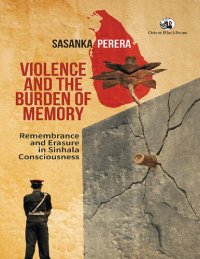
Ebook: Violence and the Burden of Memory: Remembrance and Erasure in Sinhala Consciousness
Author: Sasanka Perera
- Year: 2015
- Publisher: Orient Blackswan
- Language: English
- pdf
post-independence Sri Lanka has been wracked by decades of Civil war and political violence, particularly from the late 1970s to 2009. These protracted conflicts have been immensely destructive, resulting in many thousands of deaths and disappearances, both of armed personnel (whether of the Sri Lankan state or separatist outfits) and civilians.</br>
How is such extraordinary institutional violence remembered? Political conflict in Sri Lanka and the Attendant death and destruction have resulted in the emergence of public monuments and memorials, built and maintained by the State or other public organisations as well as private ritual and Memorial practices, which have occasionally moved into the public domain. They have also provoked a great deal of commentary in the form of visual arts.</br>
< em> violence and the burden of memory;/em> takes as its br>Theme these forms of Remembering and memorialising large-scale violent death and destruction and the Attendant loss, grief and suffering. Sasanka per era explores how issues of memory and forgetting are represented in these monuments, public and private rituals and the works of visual artists through sociological analysis and ethnographic research. This, then, is read within a wider intellectual discourse on how memory works, drawn from other global contexts.</br>
The author skilfully demonstrates how most public narratives, particularly state narratives, of sinhala heroism have focused on institutional victories and successes, thereby erasing particular acts of individual suffering and loss and eroding spaces for critical evaluation. While the state has enjoyed relative success in preserving and presenting a public narrative of triumph and heroism through its war memorials and military monuments and rituals, it has not been as successful at providing survivors of the fallen spaces in which to remember and mourn their dead, nor at mourning the loss of innocence effectively. Personal and evaluative approaches to the horrors of political violence have, therefore, become the province of private forms of Remembering and artistic commentaries. </br>.